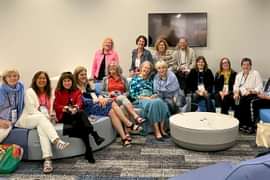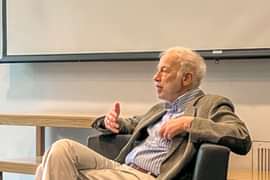
May 25, 2018
Tang Fellow Launches ‘SYNAPSE’ to Enhance Student Learning
Christine Marshall is introducing a series of seven steps students can apply to enhance their learning.by Jenny Barker
The Tang Institute at Andover, which cultivates new ideas for teaching and learning in four emerging areas of education, announced that Tang Fellow Christine Marshall has introduced a set of seven strategies, titled SYNAPSE, to enhance student learning. Marshall began working at the Institute in 2015 on her project, “Scientific Learning,” designed to help students apply scientific methods to their own study practices and habits of mind. This year she was one of five fellows in the Institute’s “Learning to Learn” area, which supports projects focused on building skills and habits of mind that enable students to “learn about, understand, and drive their own learning.”
A neuroscientist by training, Marshall has spent the last decade teaching courses in advanced biology, molecular biology research, and bioethics at Andover. As a fellow, she has worked with students and colleagues to embed a co-curriculum on learning and memory into core biology courses at Andover. She is currently measuring impacts of these lessons on scientific literacy, learning disposition, and scientific learning, using a novel assessment instrument she developed with outside collaborators and support from the Institute. Marshall’s latest innovation, SYNAPSE, is inspired by the fundamentals of neuroscience and her work with students in the classroom.
“We are all ‘scientific learners,’” said Marshall. “A continuous cycle of informing, experimenting, and reflecting fuels each baby step during our early years. Yet our learning behaviors tend to change as we grow older, when more of the information we learn is imparted with less experimentation or discovery. Students who re-engage their scientific learning roots are often the happiest and most effective lifelong learners.”
Introducing SYNAPSE
SYNAPSE proposes a set of steps to help students experiment with their own learning, specifically approaches to managing attention, complexity, cognitive load, sleep, and stress. With these biologic drivers of learning under greater control, students can incorporate any new information before them into useful, working knowledge.
“At Andover, we ask our students to work at the leading edge of their ability, stretching their way through higher levels of disciplines and deliberately adopting new practices and habits of mind that support their academic growth,” said Marshall. “SYNAPSE is a fun way for students to learn about different learning strategies and their impacts on memory formation. They come away with a more nimble stance towards learning and positive view of their potential.”
The Seven Steps: SYNAPSE
SIMPLIFY: Reduce the process to its core elements
YES: “Yes!” Activate your growth mindset.
NARRATE: Convert what you’re learning into a story
ASSOCIATE: Connect new ideas to what you already know.
PERSONALIZE: Relate what you’ve learned to your own life.
SLEEP: Say YES to sleep.
EXERCISE: Apply your new knowledge to real situations.
Student Agency: Taking Control of Study Habits
During 2017-2018, student Gabija Saginaite ‘18 enrolled in Marshall’s elective course at Andover on the neurobiology of learning, memory and sleep. As part of the course, Saginaite deployed strategies for managing her attention and cognitive load while studying.
“One of things we learned that inspired me to alter my study habits was that when stimuli are difficult to perceive, we attend to what we know rather than new information,” she said. “Consequently, it is harder to learn new material because we remember the things we attend to. Chemistry is a subject I would definitely put in the ‘difficult to perceive stimuli’ category.”
Saginaite’s experiment to test this idea involved three strategies.
- After finishing class, she quickly ran through the gist of topics planned for the next session so she would understand the main ideas in advance. Simple frameworks helped her manage the intrinsic load of everyday learning in chemistry class.
- She also choose a quiet place in the library for studying, rather than a table with friends, music, and conversation. Focusing her attention on the new topics she was learning helped her maximize memory formation while she studied.
- Finally, she added every new topic she encountered to a “concept map” of all topics covered during the term, making new topics easier to understand and retain.
“After following this plan for one week, not only did I remember what I had learned more easily, but also had less trouble when presented with new topics that built on the knowledge I had already acquired,” she said. “The night before the test, my studying was much more efficient than all the times before because I already had a good understanding of the chapter and only needed to revise what I had learned. This strategy made learning a lot easier and reduced the amount of effort it took me to master the topics.”
Research, Outputs
Before coming to PA, Marshall studied psychology and biology at Smith College and earned her PhD in neurobiology and behavior from Columbia University. As a post-doctoral research fellow at Harvard Medical School, she had the opportunity to mentor undergraduates working on thesis projects and began shifting her focus to science education. Marshall is currently finishing a book that offers practical directives for learners working at each step, along with uncomplicated guides to the neurobiology and cognitive psychology involved in learning.
For more information on SYNAPSE or other aspects of her work, you may contact Christine Marshall directly at [email protected].
About the Tang Institute
The Tang Institute helps to prepare students for today’s complex and interconnected world. Our faculty fellows are at the heart of our work; they collaborate with partners and students to develop innovative approaches to teaching and learning. Through an exchange of knowledge on campus and in education more broadly, we aim to explore, test, and introduce impactful learning experiences to students at Andover and beyond. Within this purpose is a commitment to four emerging areas in education: learning to learn, hybrid and online learning, digital platforms and resources, and interdisciplinary initiatives.





